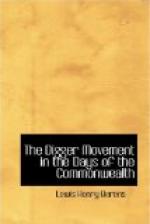It is almost impossible to read Winstanley’s earlier theological pamphlets without being struck by the similarity in thought and doctrine with those to-day still held by the Society of Friends, or Quakers, whose original name amongst themselves, be it remembered, was the Children of Light. And it is interesting to note that during the seventeenth and eighteenth centuries the opponents of the Quakers repeatedly taunted them with being disciples of Winstanley the Leveller.[49:1] Thus the Right Reverend Thomas Coomber, Dean of Durham, in a pamphlet significantly entitled Christianity no Enthusiasm: Or the several kinds of inspiration and Revelation pretended to by the Quakers tried and found destructive to Holy Scripture and True Religion, published in 1678, wrote as follows:
“First for their original, it may seem more difficult to discover, where Sects are not called after their Founder, but after some property, etc., it may be harder to trace them to their head. In 1652 their beginning is supposed, and then abouts they were so called and known. John Whitehead fixes it in the year 1648;[49:2] and Hubberthorne in 1660 told the King that they were then twelve years standing.[49:3] In that black year to these kingdoms (1648) their pretended light appeared.[50:1] ... But the very draughts and even body of Quakerism are to be found in the several works of Gerrard Winstanley, a zealous Leveller, wherein he tells us of the arising of new times and dispensations, and challengeth Revelation very much for what he writ.”
Coomber proceeds to quote from every one of Winstanley’s theological pamphlets, and then continues:
“That these are the Quaker principles is well enough known, allowing for some little alterations, as few Sect-Masters but have their doctrines varied by their Proselytes.... Now, considering these opinions, the year, the country[50:2] (as The Mystery of God is dedicated to his “beloved countrymen of the County of Lancaster"), the printer Giles Calvert, and that several Levellers settled into Quakers, we incline to take them for Winstanley’s Disciples and a branch of the Levellers. And what this man writes of—levelling men’s estates, of taking in of Commons, that none should have more ground than he was able to till and husband by his labour—proving unpracticable by reason of so many tough old laws which had fixed propriety; yet it is pursued by the Quakers as much as they well can, in thouing everybody, in denying Titles, Civil Respects, and terms of distinction among men, and at first they were for Community.”
If Winstanley’s writings be really the source whence the early Quakers, the Children of Light, drew their most characteristic tenets and doctrines, as we ourselves do not doubt, then surely his noble ambition has been satisfied: for through them he has, indeed, influenced the thought of his country, the thought of the whole world, which owes more than we even yet realise to their pure and altruistic teachings. However, leaving this most interesting question to be decided by our readers, each for himself, we shall now place the chief contents of these writings before them, using as far as possible Winstanley’s own words.




